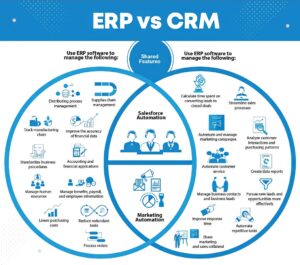In today’s fast-paced business landscape, the use of technology to streamline operations and enhance customer relationships is paramount. Two prominent tools that play a pivotal role in this regard are Enterprise Resource Planning (ERP) and Customer Relationship Management (CRM) systems. Both ERP and CRM have unique functionalities and purposes, making them indispensable for businesses. In this article, we will delve into the distinctions between ERP and CRM, exploring their features, benefits, and how they can empower your organization.
Understanding ERP (Enterprise Resource Planning)
What is ERP?
Enterprise Resource Planning, abbreviated as ERP, is a comprehensive software solution designed to manage and optimize various business processes within an organization. These processes encompass areas like finance, human resources, inventory management, production, and more. ERP systems serve as a centralized hub for data and facilitate seamless communication across different departments.
Key Features of ERP
- Integration: ERP systems integrate data from various departments into a single database, ensuring consistency and accuracy.
- Automation: They automate repetitive tasks, reducing manual errors and improving efficiency.
- Real-time Data: ERP provides real-time insights into business operations, enabling informed decision-making.
- Scalability: These systems can scale as your business grows, accommodating changing needs.
Exploring CRM (Customer Relationship Management)
What is CRM?
Customer Relationship Management, known as CRM, is a software tool that focuses on enhancing interactions with customers. It enables businesses to manage customer data, track leads, and improve communication, ultimately strengthening customer relationships and boosting sales.
Key Features of CRM
- Contact Management: CRM systems store customer information, making it easy to manage and personalize interactions.
- Sales Automation: They streamline the sales process, from lead generation to conversion.
- Marketing Integration: CRM software often integrates with marketing tools for targeted campaigns.
- Customer Support: CRM systems help in providing excellent customer support by tracking issues and resolutions.
ERP vs CRM: The Key Differences
Now that we’ve explored the individual functionalities, let’s compare ERP and CRM:
Scope of Operations
- ERP: Primarily focuses on internal processes and operations within an organization.
- CRM: Concentrates on managing external interactions and relationships with customers.
Data Management
- ERP: Manages diverse data types, including financial records, inventory, and employee information.
- CRM: Centralizes customer data and communication history for better customer service.
Purpose
- ERP: Aims to improve overall operational efficiency and resource management.
- CRM: Aims to enhance customer satisfaction, loyalty, and sales.
User Base
- ERP: Utilized by various departments across an organization, including finance, HR, and production.
- CRM: Mainly used by sales, marketing, and customer service teams.
Benefits of ERP and CRM
ERP Benefits
- Efficiency: Streamlined processes result in improved efficiency and reduced operational costs.
- Data Accuracy: Centralized data ensures accuracy and reduces data discrepancies.
- Decision Support: Real-time insights empower informed decision-making.
- Scalability: Can adapt to your organization’s growth.
CRM Benefits
- Customer Insights: Deeper understanding of customer needs leads to more personalized interactions.
- Sales Growth: Improved lead management and sales processes boost revenue.
- Customer Retention: Enhanced customer service fosters loyalty and reduces churn.
- Marketing ROI: Targeted marketing campaigns yield better returns.
Conclusion
In the world of modern business, both ERP and CRM systems play pivotal roles in ensuring success. While ERP streamlines internal operations, CRM focuses on nurturing customer relationships. The choice between ERP and CRM depends on your organization’s specific needs and goals. Ideally, many businesses find value in integrating both systems to harness the full potential of data-driven decision-making and exceptional customer experiences.
FAQs
1. Can a business use both ERP and CRM simultaneously?
Absolutely! Many businesses benefit from the integration of both systems to streamline operations and enhance customer relationships.
2. Are ERP and CRM systems suitable for small businesses?
Yes, ERP and CRM systems can be scaled to suit the needs of small businesses, helping them grow efficiently.
3. How can ERP and CRM improve customer service?
ERP ensures the availability of accurate customer data, while CRM streamlines communication, leading to better customer support.
4. What factors should a business consider when choosing between ERP and CRM?
Consider your organization’s specific needs, goals, and budget when deciding which system to implement.
5. Is training required for employees to use ERP and CRM effectively?
Yes, training is essential to ensure that employees can maximize the benefits of both ERP and CRM systems.
